Blyth Deans
Aged 27
2008 Graduated University of Strathclyde, BA(Hons) Marketing
2009 joined Audit Scotland as a trainee
2013 became an auditor with Audit Scotland
2014 gained CIPFA
2014 working in Audit Scotland's Glasgow office
Print this page | Return to Annual Review
Audit Scotland is a statutory body that carries out audits and investigations for the Auditor General for Scotland and the Accounts Commission for Scotland.
The Auditor General secures the audit of the Scottish Government and other public bodies in Scotland, except local authorities, and is independent of the Scottish Government and Scottish Parliament.
The Accounts Commission is the public spending watchdog for local government. It holds councils in Scotland to account and helps them improve. It operates impartially and independently of councils and the Scottish Government and meets and reports in public.
Our vision is to be a world-class audit organisation that improves the use of public money.
We provide independent assurance to the people of Scotland that public money is spent properly and provides value for money.
We aim to achieve this by:
carrying out relevant and timely audits of the way the public sector manages and spends money
reporting our findings and conclusions in public
identifying risks, making clear and relevant recommendations for improvement, and following these up.
Scotland's public sector continues to operate in an environment of change. In the past year we have seen major reform and new legislation that will change the way public bodies work and deliver services to the people of Scotland in a time of growing demands and dwindling resources.
Our focus has been on responding and adapting. We have launched key projects examining both how we work and what our stakeholders - the people of Scotland, public bodies, decision-makers - expect of us and what we produce. This will help ensure we are targeting the right areas, working effectively and efficiently, and that we reach the different audiences for our work in ways that reflect their needs and how they access and use information.
We remain very conscious of the need to demonstrate we deliver value for money and make a real contribution to public services. We cut the cost of audit by 23.5 per cent in the past four years, and reshaped our workforce. Throughout this we remain committed to world-class audit work that improves the use of public money and public services. We hope you can see from the examples in this review how we achieve this.


Caroline Gardner
Accountable Officer
and Auditor General
for Scotland
Ronnie Cleland
Chair of Audit Scotland Board
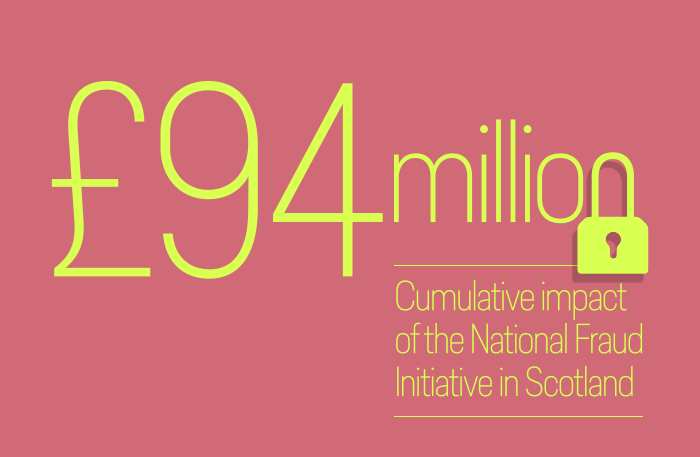
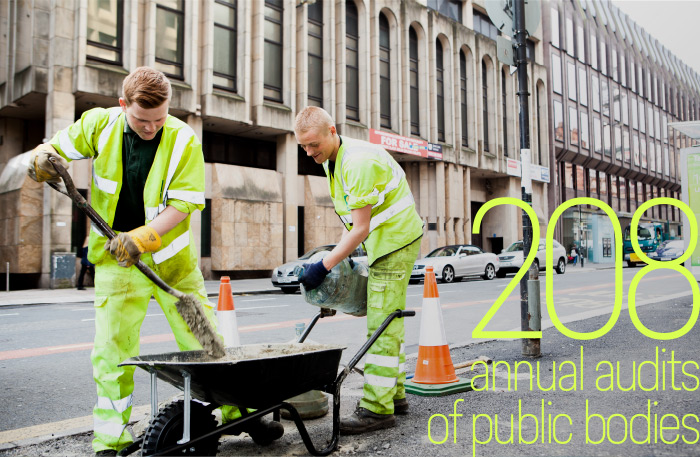
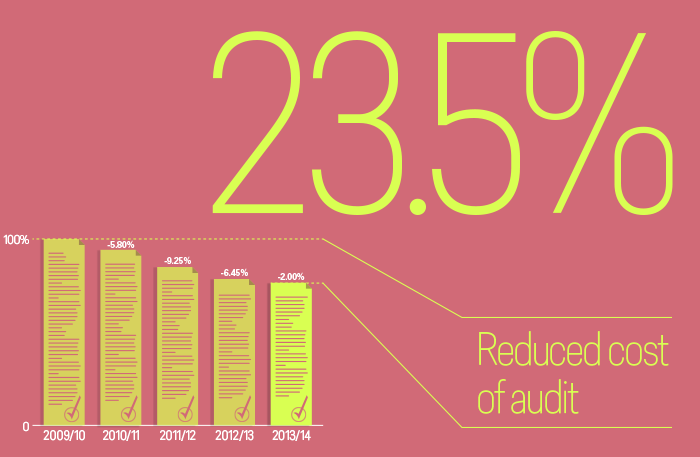
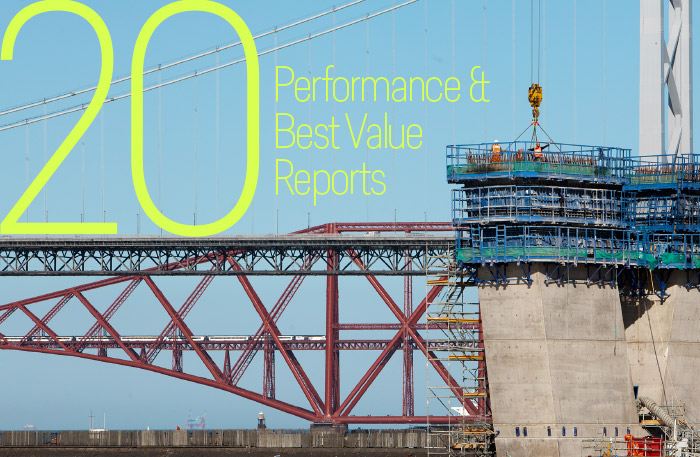
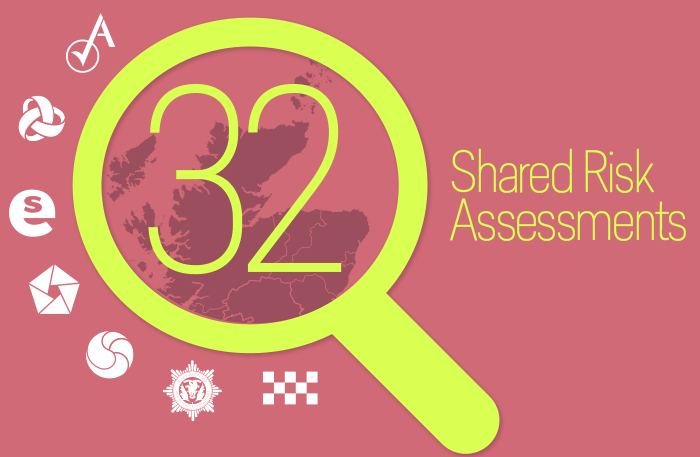
2013/14 in numbers
£94million - cumulative impact of the National Fraud Initiative
208 annual audits of public bodies undertaken
23.5% reduced cost of audit
20 performance and best value reports
32 shared risk assessments
Four of our thirty five graduate trainee auditors: Pamela Morrison, Mahrouf Shafi, Mhairi Williamson and Jordan Roberts
As public bodies face increasing demands on services, in many cases combined with a decrease in funding, they need to make important decisions about their spending and services.
Our auditors work closely with the public bodies we hold to account for their use of public money. Around half of the financial audits are carried out by private firms of accountants. Together, we provide assurance to the public that organisations spend properly and get value for money.
We support improvement in the organisations we audit and provide feedback on their performance. We bring an objective, professional view, and a commitment and enthusiasm, to improving public services.
Our work takes us into many areas, and the case studies below reflect some of the issues with which we've helped public bodies. They also portray their views about the quality of our service.
In 2013/14 we launched a project to streamline our audit process to ensure it is consistent and remove any duplication or unnecessary steps while maintaining full compliance with international auditing standards and the Code of Audit Practice.
Most accounts we audit are prepared under International Financial Reporting Standards and we use the International Standards on Auditing.

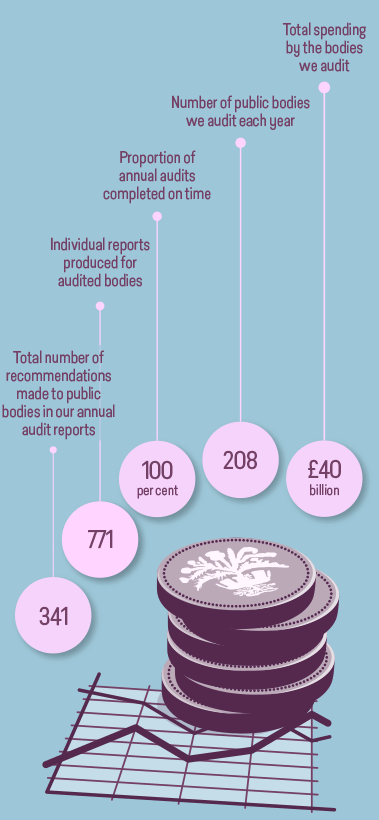
Our audits
Total spending by the bodies we audit - £40 billion
Number of public bodies we audit each year - 208
Proportion of annual audits completed on time - 100%
Individual reports produced for audited bodies - 771
Total number of recommendations made to public bodies in our annual audit reports - 341
Auditors have a positive impact on public bodies by agreeing areas for improvement with them. Other changes we influence can be more subtle and difficult to measure but are equally important.
During 2013/14 Audit Scotland approved a method for measuring and reporting impact. Our auditors introduced a corporate impact framework to plan, report and assess responses to our work. A four category model sets out the broad areas where we expect our work to have an impact.
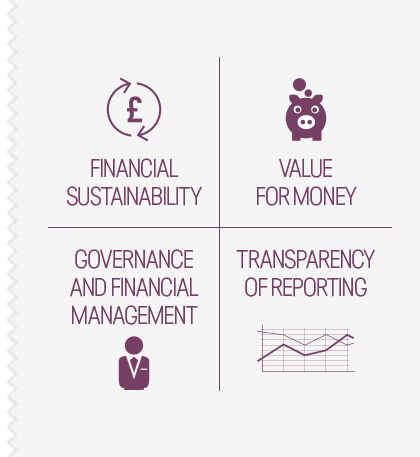
In our annual audit reports, we identify key issues and make recommendations on them. These are categorised opposite.
For more information, read our
annual report on Impact.
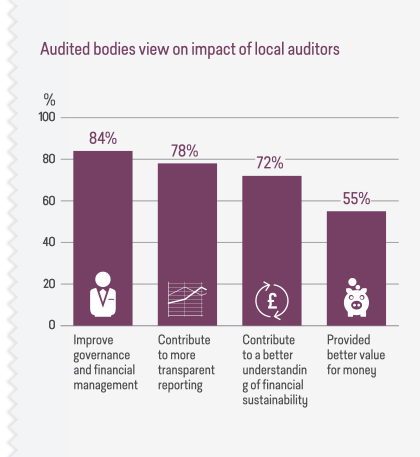
We seek feedback from public bodies on the quality of our financial audit work. This year we surveyed local and central government bodies, with positive responses about the overall quality of our service - 97 per cent and 94 per cent respectively. They reported that the biggest contribution from an audit was improved governance and financial management.
Each year we produce a Transparency and Quality Report which details our arrangements for achieving high-quality audit work. This is available on our website. We also launched a new quality framework project in early 2013.
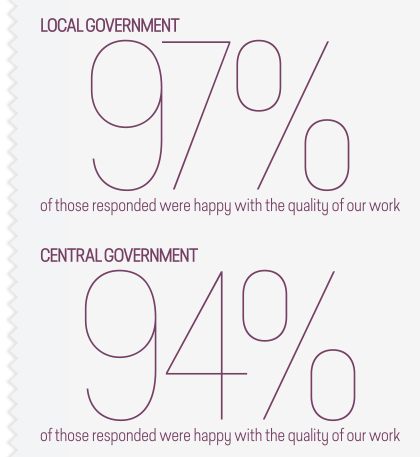
Local Government - 97% of those who responded were happy with the quality of our work
Central Government - 94% of those who responded were happy with the quality of our work
As an auditor within Audit Services Group, my job brings a number of interesting challenges. No two days are the same.
Whether I am attending client meetings at East Dunbartonshire Council to discuss complex audit issues or on a stay away audit to the Shetland Islands, each task has a distinct purpose and brings an element of variety to the day-to-day job.
I enjoy the opportunity to move between teams and audit locations and gain a valuable insight into how our public sector bodies operate. While our primary aim is to hold them to account and ensure that taxpayers' money is spent appropriately, we also gain an in depth knowledge of how they work and the challenges they face.
In the five years I have been with Audit Scotland I have been given support to gain the CIPFA professional qualification, which is recognised around the world. I am now a Chartered Public Finance Accountant.
Audit Scotland provided me with the ideal mix of flexible study time and real work experience to help me achieve my professional goals. I had studied Marketing prior to joining Audit Scotland and I know we take applications from people from a variety of backgrounds. You don't need to have auditing experience, just meet our professional requirements.
Change is constant in my role and the variety keeps you on your toes.
Blyth Deans
Aged 27
2008 Graduated University of Strathclyde, BA(Hons) Marketing
2009 joined Audit Scotland as a trainee
2013 became an auditor with Audit Scotland
2014 gained CIPFA
2014 working in Audit Scotland's Glasgow office
We provide a very successful graduate professional training scheme leading to an ICAS qualification as a Chartered Accountant (Institute of Chartered Accountants of Scotland).
As part of our scheme, we offer the opportunity to work in either financial or performance and best value, or indeed both areas. Graduates are assured of being involved in high profile work that not only makes a difference but is also rewarding.
Visit the ICAS website at icas.org.uk

Mark Roberts and Rebecca Seidel were the authors for our Renewable energy report.
We carry out performance audits across the public sector for the Auditor General for Scotland and the Accounts Commission. We report on these in public providing analysis of whole systems and public services, focussing on areas of particular public interest, and giving the public and decision-makers a complete picture of particular sectors.
Our work highlights areas where services could improve, how bodies can plan for the future and where money can be saved without reducing or affecting the quality of public services.
In 2013/14, we reviewed police reform, highlighted the need for more comprehensive and clearer reporting on costs of public projects and on public finances, and emphasised the need to start planning how services, such as healthcare, will be delivered in the future.
We publish our findings and report on them to the Scottish Parliament for central government and NHS audits, and the Accounts Commission for local government work.
In 2013/14, the Parliament's Public Audit Committee held evidence sessions on eight of our audits, calling on Cabinet Secretary and relevant accountable officers from the Scottish Government and other public bodies to answer questions.


Central government sector reports
Local government sector reports
Health sector reports
Reports covering local and central government sectors
Report covering health, local and central government sectors
20 performance and best value reports in 2013/14 - audits carried out by sector:
8 x local
2 x health
6 x central
3 x cross-sector between local and central
1 x cross-sector between health, central and local
Central government sector reports
Developing financial reporting in Scotland
Scotland's key transport infrastructure projects
Local government sector reports
Overview of local government in Scotland
Health sector reports
Management of patients on NHS waiting lists - audit update
NHS financial performance 2012/13
Cross-sector reports
Reports covering local and central government sectors
Managing early departures from the Scottish public sector
Scotland's public sector workforce
Report covering health, local and central government sectors
Our reports on Renewable energy and Key transport infrastructure projects considered some of Scotland's biggest major capital investment plans.
We found the Scottish Government had a clear strategy for renewables and had made steady progress. But achieving its overall goals would be challenging as it depended on private sector investment, and the economy and changes in UK energy policy meant projects were progressing slower than expected.
Our review of Scotland's five major transport projects found they were mostly on time and on budget. But we highlighted the need for clearer public reporting on costs; the reported public cost of building them was £3.8 billion, but the actual total of public money committed is £7.5 billion over the next 30 years.

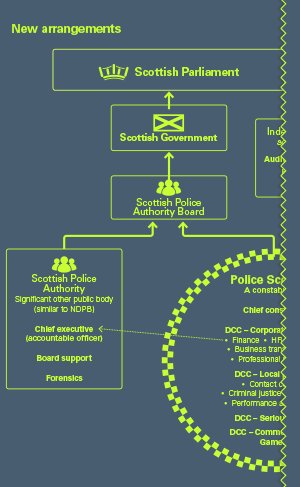
There have been a number of mergers and restructures in Scotland's public sector in recent years.
The creation of a single Scottish police service was one of the biggest of these since devolution. We reported that the reform was achieved by the deadline of 1 April 2013 and front-line police services were kept running throughout. However, we found the process had been hampered by poor information, lack of clarity about roles, and difficult relationships. We also found it was unclear how £1.1 billion savings by 2026 would be achieved.
We also called for clear monitoring and reporting on whether the reforms were achieving their aims and on police performance.
The Scottish Government is three years into a 10-year programme to reform care of older people, with a quarter of the population expected to be 65 or older by 2035 and public bodies spending £4.5 billion a year on care for older people.
Our review found the programme had brought together the different bodies involved in services but progress in reshaping care was slow. We said the government and its partners needed to plan how to move resources from hospitals into the community and to better understand why activity and spending on services for older people varied across Scotland.

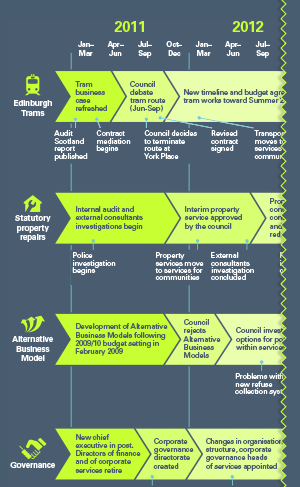
During 2013/14 we continued to deliver Best Value audits of local authorities. We carried out targetted work based on the risk assessments we carry out annually in partnership with other scrutiny bodies.
In 2013/14 we published reports on the audits of four councils: City of Edinburgh; Moray; Aberdeenshire; and South Ayrshire.
Our report on Edinburgh found it had improved services and the way it worked. But it was facing a challenging financial situation, needing to find recurring annual savings of £107 million by 2017/18. The report praised improved performance in areas like partnership working, children's services, economic development and reducing inequalities.
We reduced our costs and fees by 23.5 per cent in real terms over four years. We also merged our performance audit and Best Value directorates. We continue to look to the future in terms of workforce planning and changing the way we work.
To support staff development and engagement, we launched our Personal Development and Growth initiative, along with internal online learning portal i>learn, and in early 2014 started our healthy working lives initiative.
During 2013/14, our staff received an average of 13 days training and personal development (compared with 7.81 days in 2012/13). We also run one of the largest public sector accountancy training schemes in Scotland with 35 trainees and staff working towards CIPFA and ICAS qualifications. Six trainees successfully completed their qualifications last year.
This year we kept our status as 'One to watch' in the Best Companies survey of workplaces. We have continued to provide everyone who works with us the opportunity to excel and we value the different perspectives, skills and rich mix of talent that is within our workforce.
We held a series of 'Re:Connect' sessions, involving all colleagues, focussing on our core values and discussing the direction and priorities of the organisation. This built on similar sessions in the preceding two years, during which we agreed our five core values:
Independence and integrity
Valuing people
Quality
Cooperation
Great communication

Stats
Staff (whole time equivalent) - 258
Gender - 49% male, 51% female
Staff turnover - 10%
Training days per person (days in a year) - 13
Sickness absence per person (days in a year) - 6
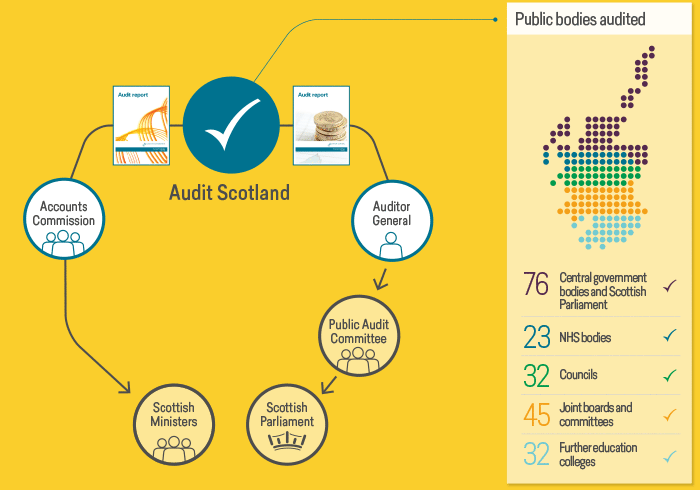
Auditor General for Scotland

Auditor General for Scotland and accountable officer for Audit Scotland
The Auditor General's role is to appoint auditors to Scotland's central government and NHS bodies, examine how public bodies spend public money, help them to manage their finances to the highest standards and check whether they achieve value for money.
Find out more about the role of the Auditor General on our website at
www.audit-scotland.gov.uk/about/ags/
Accounts Commission

Douglas Sinclair, Chair of the Accounts Commission
The Accounts Commission is the public spending watchdog for local government. It holds councils in Scotland to account and helps them improve.
Find out more on our website at
www.audit-scotland.gov.uk/about/ac/
Audit Scotland
Audit Scotland is a statutory body set up in April 2000 under the Public
Finance and Accountability (Scotland) Act 2000. We help the Auditor General
for Scotland and the Accounts Commission check that organisations spending public money use it properly, efficiently and effectively.
Find out more on our website at
www.audit-scotland.gov.uk
Reporting process in Audit Scotland
Auditor General
Caroline Gardner is Auditor General for Scotland and accountable officer for Audit Scotland
The Auditor General's role is to appoint auditors to Scotland's central government and NHS bodies, examine how public bodies spend public money, help them to manage their finances to the highest standards and check whether they achieve value for money.
Find out more about the role of the Auditor General on our website at www.audit-scotland.gov.uk/about/ags/
Accounts Commission
Douglas Sinclair is Chair of the Accounts Commission
The Accounts Commission is the public spending watchdog for local government. It holds councils in Scotland to account and helps them improve.
Find out more on our website at www.audit-scotland.gov.uk/about/ac/
Audit Scotland
Audit Scotland is a statutory body set up in April 2000 under the Public
Finance and Accountability (Scotland) Act 2000. We help the Auditor General
for Scotland and the Accounts Commission check that organisations spending public money use it properly, efficiently and effectively.
Find out more on our website at www.audit-scotland.gov.uk
Public Audit Committee
Visit the Public Audit Committee web pages at www.scotland.gov.uk/Topics/Government/Finance/spfm/scotparlaudcom
Scottish Parliament
Visit the Scottish Parliament web pages at www.scottish.parliament.uk/
Scottish Ministers
Visit the Scottish Government web pages at www.scotland.gov.uk/
The board oversees the governance of Audit Scotland while its audit committee appoints internal auditors and receives the annual accounts and internal audit reports.
The board met nine times during the year, and the audit committee four times. The remuneration and human resources committee, which reviews salaries and terms of conditions of most staff, met four times.
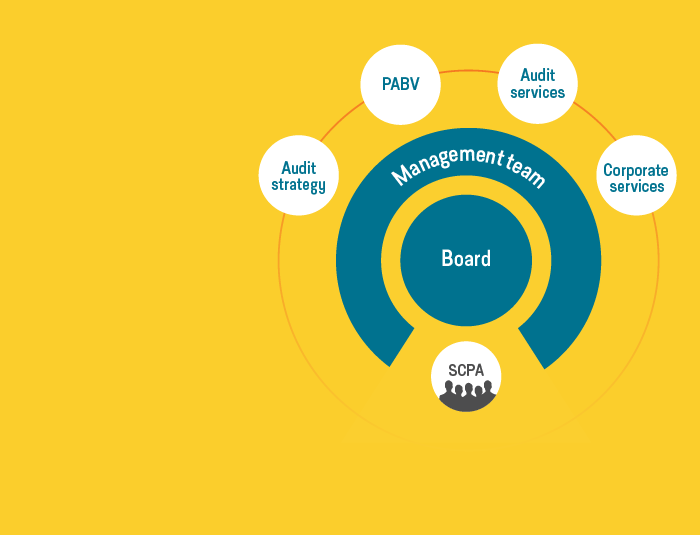
Audit strategy
Provides advice and support functions to the Auditor General, the Accounts Commission, Audit Scotland staff and management, and appointed firms of auditors. It also co-ordinates the National Fraud Initiative in Scotland.
Performance Audit and Best Value
To streamline our operations, this year we merged our Performance Audit and Best Value teams who carry out the audits across the public sector.
Audit services
We audit and certify the financial statements of Scotland's public sector organisations and hold them to account for their use of taxpayers' money to help them improve and perform better.
Corporate services
We provide Communications, Finance and Facilities, HR and IT expertise to Audit Scotland.
SCPA
The Scottish Commission for Public Audit (SCPA) is central to holding Audit Scotland to account. The SCPA consists of five MSPs and meets in public. It appoints our non-executive members, scrutinises our budget, annual report and accounts, and produces reports on these.
Find out more about its work at www.scottish.parliament.uk
Management team
Each member has responsibility for a different area and jointly, they oversee the day-to-day operations of Audit Scotland.
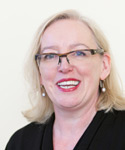
Diane McGiffen
Chief Operating Officer

Caroline Gardner
Auditor General for Scotland and accountable officer for Audit Scotland

Russell Frith
Assistant Auditor General

Fraser McKinlay
Director of Performance Audit and Best Value and Controller of Audit

Fiona Kordiak
Director of Audit Services

Lynn Bradley
Director of Corporate Programmes
Barbara Hurst was a member of the Management team until July 2013.
Board

Ronnie Cleland
Chair of the board

Douglas Sinclair
Chair of the Accounts Commission
(appointed Dec 2013)

Caroline Gardner
Auditor General for Scotland and accountable officer for Audit Scotland

Katharine Bryan
Independent non-executive member
(until 31 March 2013)

John Maclean
Independent non-executive member

John Baillie
Chair of the Accounts Commission
(until Nov 2013)
Board
Ronnie Cleland - Chair of the board
Douglas Sinclair - Chair of the Accounts Commission (appointed Dec 2013)
Caroline Gardner - Auditor General for Scotland and accountable officer for Audit Scotland
Katharine Bryan - Independent non-executive member (until 31 March 2013)
John Maclean - Independent non-executive member
John Baillie - Chair of the Accounts Commission (until Nov 2013)
Management team - Each member has responsibility for a different area and jointly, they oversee the day-to-day operations of Audit Scotland.
Diane McGiffen - Chief Operating Officer
Caroline Gardner - Auditor General for Scotland and accountable officer for Audit Scotland
Russell Frith - Assistant Auditor General
Fraser McKinlay - Director of Performance Audit and Best Value and Controller of Audit
Fiona Kordiak - Director of Audit Services
Lynn Bradley - Director of Corporate Programmes
Barbara Hurst was a member of the Management team until July 2013.
Corporate services - We provide Communications, Finance and Facilities, HR and IT expertise to Audit Scotland.
Audit services - We audit and certify the financial statements of Scotland's public sector organisations and hold them to account for their use of taxpayers' money to help them improve and perform better.
Performance Audit and Best Value - To streamline our operations, this year we merged our Performance Audit and Best Value teams who carry out the audits across the public sector.
Audit stategy - Provides advice and support functions to the Auditor General, the Accounts Commission, Audit Scotland staff and management, and appointed firms of auditors. It also co-ordinates the National Fraud Initiative in Scotland.
SCPA - The Scottish Commission for Public Audit (SCPA) is central to holding Audit Scotland to account. The SCPA consists of five MSPs and meets in public. It appoints our non-executive members, scrutinises our budget, annual report and accounts, and produces reports on these.
Find out more about its work at www.scottish.parliament.uk
Audit Scotland's accounts are independently audited on behalf of the SCPA, which appointed Alexander Sloan Chartered Accountants to carry out the audit. Our full annual report and accounts are available on our reports page
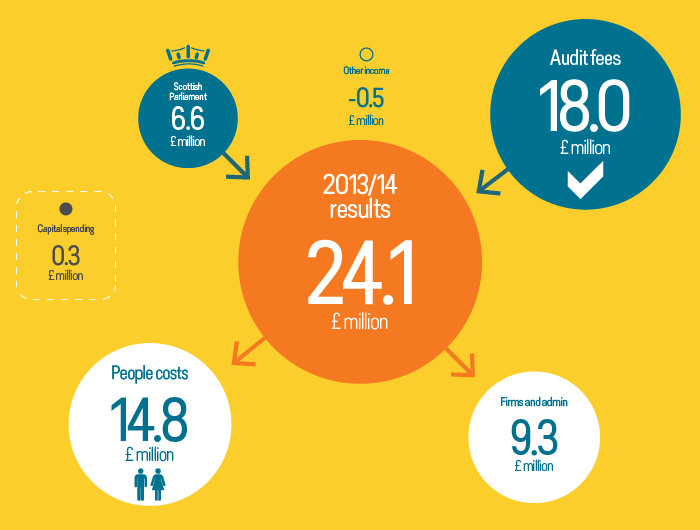
* Other finance income is comprised of the expected interest income from the local government pension scheme assets less the interest payable on the scheme liabilities. The 2012/13 figure has been restated to reflect compliance with the revised International Accounting Standard 19 on employee benefits.

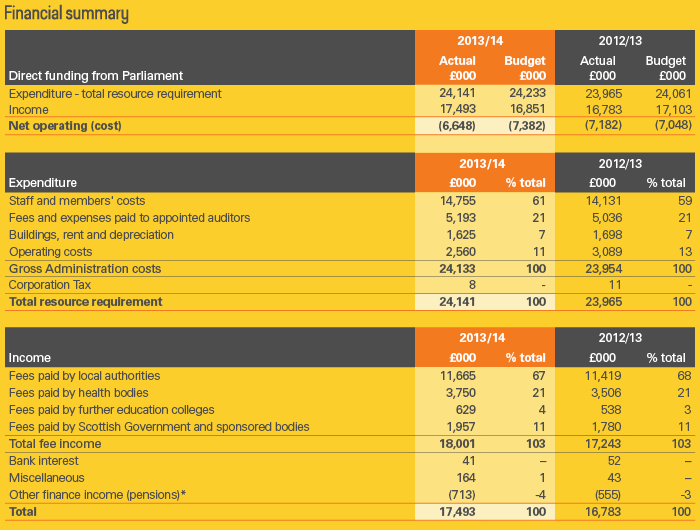
Audit Scotland's accounts are independently audited on behalf of the SCPA, which appointed Alexander Sloan Chartered Accountants to carry out the audit.
2013/14 results - £24.1 million
Income: Scottish Parliament £6.6 million, Audit fees £18 million, other income £-0.5 million
Capital spending - £0.3 million
People costs - £14.8 million
Firms and admin - £9.3 million
Our full accounts are available in our Annual Report and Accounts.
Links to our annual reports
© Audit Scotland 2014